#]Music Streaming App Development
Explore tagged Tumblr posts
Text
Gamification and Music Apps: Engaging Audiences in 2023
The music industry has undergone massive changes in the past decade. Streaming services like Spotify and Apple Music have become the dominant way people consume music. But with increased competition, music streaming apps need creative strategies to engage and retain users.
“Enter gamification.”
Gamification has successfully engaged users across industries - from fitness apps like Nike+ to language learning platforms like Duolingo.
It also involves applying game design elements to non-game contexts. This could mean including points, badges, leaderboards, or other game-like features in an app.
When done right, gamification offers many benefits for music streaming app development in 2023:
## Boosting Engagement and Loyalty
A key challenge for music streaming apps is keeping users engaged over time. Entertainment options have expanded significantly in recent times.
Gamification gives users incentives to keep opening the app. Tactics like daily streaks and rewards encourage habit-building.
For example, Spotify gamified exercise by partnering with brands like Nike. Users could earn badges for running certain distances. This boosted engagement during workouts.
Leaderboards drive competitive instincts. People will stream more music to top their friends' listening totals.
These techniques increase loyalty. A study found gamified users spent 9% more time in apps than non-gamified users.
Gamification Tactic
Example
Benefit
Daily Streaks
Spotify - Listen 7 days in a row
Habit-building
Badges
Nike+ Run Club - Run 5km badge
Engagement during activity
Leaderboards
Friends' listening totals
Competition drives streaming
## Creating a Personalized Experience
Music taste is deeply personal. Gamification allows apps to tailor experiences to different users.
Personality quizzes help music streaming apps understand listeners' preferences. Streaming services can then recommend music based on quiz
results.
For example, Pandora uses the Music Genome Project. This database analyzes songs by musical attributes like melody and rhythm. Pandora quizzes users when they create stations to serve personalized tunes.
Badges reward users for listening to new genres or artists. This encourages discovery outside traditional tastes.
## Turning Music into a Journey
Music often accompanies life's journeys. Apps can gamify learning an instrument, discovering new genres, or achieving health goals.
For instance, Yousician makes learning guitar into a game. Users play along to songs and earn points for hitting the right notes. This transforms a frustrating skill into a rewarding journey.
Rocksmith gamifies learning bass, guitar, and ukulele. The app provides feedback on technique and tracks progress. This structure keeps beginners motivated while advancing their skills.
Gamification works for niche interests, too.
Adsic app rewards users for learning about jazz greats like Miles Davis. Unlocking facts and stories offers a deeper connection with jazz.
## Social Sharing
Since music taste defines identity, gamified sharing on social media can significantly boost engagement.
Apps like Spotify enable sharing listening activities, playlists, and concert events. Users earn badges for social engagement.
Integrating with platforms like Facebook, Instagram, and Snapchat encourages sharing music discoveries. Users can display their avant-garde tastes or Spotify-wrapped yearly statistics.
Social feeds within music streaming apps also stimulate engagement. Showing friends' listening activity and playlists inspires users to listen more.
## Keeping Things Fresh
Gamification relies on introducing new elements to sustain engagement. Apps should re-examine features regularly to prevent stagnation.
Limited-time quests, such as streaming a daily mix for a few continuous days, encourages brief bursts of activity. Seasonal badges also prompt engagement around events like the Grammys.
To analyze impact, companies A/B test gamification features. For example, they could trial a points-based system against a badges-only system to see what drives more streaming.
Continued innovation is crucial. Gamification that becomes stale will see declining use. Companies should solicit user feedback and telemetrics to guide iterations.
Risks to Consider
Gamification does not guarantee automatic success. Poorly executed gamification risks annoying users or seeming gimmicky.
Badges and points should meaningfully recognize milestones. Random rewards or bureaucracy frustrate users.
Leaderboards must connect to aspirational identity. Few people will compete without some personal value attached.
Constant notifications and alerts from gamification can irritate users. Apps should allow customization of prompts and incentives
Music apps should ensure gamification encourages organic engagement rather than continual in-app purchases.
Gamification should ultimately enhance the core user experience. It should not serve as a distraction or undermine the enjoyment of music.
In 2023, expect music apps to explore innovative technologies like AR for more immersive gamification experiences
Conclusion
Gamification allows music streaming apps to boost engagement, loyalty, and discovery in 2023 and beyond. However, apps should be wary of overusing gamification as user fatigue could set in. As the technology advances, expect gamification tactics to become even more immersive and personalized through innovations like virtual reality and AI-enabled recommendations. Music apps that creatively employ gamification will continue engaging users on their lifelong journey of musical discovery.
To maximize impact, companies must tailor gamification and allow customization to appeal to diverse users - from those motivated by rewards to those who prefer a straightforward experience. Gamification should be one of many tools to engage users rather than a one-size-fits-all strategy.
If you need help engaging audiences through your music app, reach out to Consagous Technologies, a leading music streaming app development company.
With expertise in gamification and mobile app development, Consagous can craft the perfect solution for your needs. Get in touch with us today!
0 notes
Text
🎬 Entertainment App Development Services: Build the Future of Digital Entertainment
In a digital-first world where users stream, binge, listen, and share content 24/7, the demand for entertainment app development services is skyrocketing. Whether you're launching the next Netflix, Spotify, or a regional OTT platform, a powerful entertainment app can place your content at the fingertips of millions.
This blog explores everything you need to know about building a successful entertainment mobile app—features, tech stack, monetization models, and how the right development partner can turn your vision into a captivating, scalable reality.
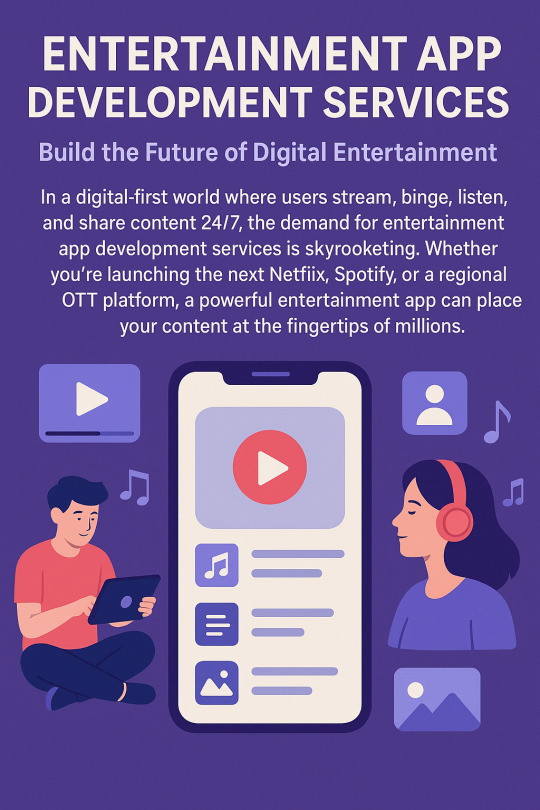
📱 Why You Need an Entertainment App in 2025
The entertainment industry is undergoing a massive digital shift. With over 6.5 billion smartphone users globally, streaming content—whether video, music, or live performances—has become the new normal. Audiences demand convenience, personalization, and immersive experiences, all of which can be delivered through a well-developed mobile application.
From OTT platform development to podcast and music streaming apps, custom solutions are now essential for media brands, production houses, indie artists, and entertainment startups.
📈 Market Stats Worth Noting:
The global video streaming market is expected to surpass $920 billion by 2030.
Time spent on entertainment and media apps increased by 40% post-pandemic.
Subscription-based platforms like Netflix, Hotstar, and Gaana have seen record-breaking growth.
If you're in the business of content creation or distribution, now is the time to invest in expert entertainment app development services.
🛠️ Core Features of a Winning Entertainment App
To compete with giants like Netflix, Spotify, or Amazon Prime, your app must go beyond basic functionality. Here's what users expect from a top-tier entertainment mobile app:
1. Content Streaming (Video/Audio)
High-quality streaming with adaptive bitrate, low buffering, and seamless playback across devices.
2. User Profiles & Personalization
Smart algorithms that recommend content based on watch history, preferences, or listening habits.
3. Subscription & Monetization Models
Support for freemium access, in-app purchases, advertisements, and recurring subscriptions.
4. Search & Filter
Powerful content discovery with keyword search, genres, languages, trending content, and more.
5. Multi-Platform Access
Cross-platform compatibility (Android, iOS, smart TVs, tablets, etc.) with a unified user experience.
6. Offline Downloads
Let users enjoy content without internet access by enabling secure offline downloads.
7. Live Streaming
Incorporate live shows, concerts, or podcasts with real-time chat and engagement.
8. Push Notifications
Keep users engaged by notifying them about new releases, trending content, and personalized suggestions.
9. Social Sharing & Integration
Let users share what they watch or listen to on social media, enhancing app visibility and virality.
🧠 Choosing the Right Technology Stack
Behind every great entertainment app is a powerful and scalable tech architecture. Here's what a reliable entertainment app development company should offer:
➤ Frontend (Mobile App Development)
React Native / Flutter for cross-platform development
Swift (iOS) and Kotlin (Android) for native apps
Custom UI/UX based on Figma, XD, or Sketch
➤ Backend
Node.js, Laravel, or Django for scalable API architecture
MongoDB or PostgreSQL for content and user data
Real-time databases like Firebase for chat, notifications, and analytics
➤ Streaming & CDN
Integration with AWS CloudFront, Vimeo OTT, or Wowza
DRM support to prevent piracy
Adaptive Bitrate Streaming (HLS, MPEG-DASH)
➤ Analytics & Recommendation Engine
Firebase, Mixpanel, or Google Analytics for user behavior
AI-powered recommendation engine to boost engagement and retention
💰 Monetization Strategies for Entertainment Apps
Monetization is crucial. Your entertainment app can generate recurring revenue through several models:
🔒 Subscription (SVOD)
Offer access to premium content on a weekly, monthly, or annual basis.
🎯 Advertisement (AVOD)
Free content monetized through banner ads, interstitials, or video ads using Google AdMob or Facebook Audience Network.
📥 Pay-per-view
Ideal for exclusive concerts, movie releases, or premium shows.
💼 Freemium
Provide basic content for free while charging for access to premium features or shows.
🤝 Why Hire Expert Entertainment App Developers?
Entertainment apps are high-stakes projects. Performance issues, bugs, or poor user experience can lead to instant churn. Here’s why hiring a team with domain expertise in entertainment mobile app development is critical:
They understand media licensing, content management, and user behavior.
They can optimize infrastructure for millions of concurrent users.
They’re familiar with UI/UX best practices that align with binge-watching or continuous listening behaviors.
They offer post-launch support for updates, bug fixes, and user feedback handling.
A team like Kickass Developers, with expertise in custom mobile app development, OTT app development, and audio/video streaming, ensures your idea is executed with precision and long-term scalability.
🚀 Final Thoughts: Your Entertainment App Is the Future of Engagement
Whether you’re building a regional OTT app, a music discovery platform, or a niche video streaming service, your success hinges on the right blend of technology, UX, scalability, and speed to market.
Investing in experienced entertainment app development services is your first step toward captivating your audience, building loyalty, and driving recurring revenue.
📞 Ready to Build Your Entertainment App?
Looking for a team that understands the entertainment industry inside and out?
Kickass Developers specializes in designing custom, high-performance entertainment applications tailored to your audience, brand, and growth goals.
📧 Contact us today at [email protected] 🌐 Or visit us at kickassdevelopers.com
#Entertainment App Developers#OTT App Development#Video Streaming App Services#Music App Development#Android Entertainment App#iOS Video App#Podcast App Developers#Live Streaming App Development#Subscription App Development
3 notes
·
View notes
Text
How Much Does It Cost to Develop an App Like Spotify

Why Businesses Want to Build a Music Streaming App Like Spotify
Imagine a world where music is on CDs. You need to carry many of them just to hear your favorite songs. In that sense, that’s how things were before the streaming apps revolutionized the market. Today, music lovers expect it is all there with the click of a button and for millions of tracks from any device.
Businesses are driving this change. They are looking for estimates to tap into this billion-dollar industry and find costs to build a music streaming app like Spotify. Before entering the music app development market, an app development company or entrepreneur must know the cost of music app development.
When determining the app Development Cost for a music streaming app, we consider key factors, features, and challenges that influence pricing. Let’s examine these.
Understanding the Core Features of a Music Streaming App
To make a music streaming app like Spotify, we will need to get certain core features to work smoothly on the app. High-quality audio streaming, personalized playlists, offline listening, and easy navigation are all included. You can also share music through communities. Each of these essential features greatly influences the overall cost to develop a music streaming app, and it should be considered in the planning stage.
To build a music streaming app like Spotify, you must include relevant features that guarantee a superb user experience. The features play a direct role in influencing the cost of developing a music streaming app. Some of the major features are mentioned below:
User Registration & Profile Management Email, phone, or social media should be considered for signup. There are personalization options allowing users to choose their preferences.
Music Library & Licensing A large collection of tracks needs licensed agreements by record labels and that too contributes to the Spotify clone app development cost.
AI-Powered Search & Discovery When looking for intelligent recommendations based on what they listen to. AI-driven search helps improve engagement and retention.
Offline Mode & Download Option Convenience for the users comes with the added cost of app development cost which necessitates storage infrastructure.
Personalized Playlists & AI Recommendations Custom playlists based on mood, genre, or history enhance user experience and retention.
In-app monetization & Subscriptions A solid revenue model, like ads and premium subscriptions, ensures sustainability.
Social & Sharing Features Users should be able to see other people’s playlists, follow people, and listen to artists.
Push Notifications & Engagement Tools For users, real-time alerts keep the game exciting for new releases, personal favorite recommendations, and promoted features.
Finally, these features have a significant influence on the music app development pricing and on the final price of the app development cost.
Factors That Affect the Cost to Develop a Music Streaming App
Businesses should analyze several key factors before determining the cost to develop an app like Spotify. Knowing these elements will allow you to better grasp the entire development expenses and budget accordingly.
Before calculating the Spotify clone app development cost, businesses must consider the following factors:
1. App Complexity & Features
The basic app development cost is going to be less spending with standard streaming features. Whereas an advanced app with AI Recommendations, Offline mode, and high security the pricing will be higher.
2. Choice of Platform (iOS, Android, Web)
It is known that developing one or more platforms is relatively cheaper than developing a native iOS or Android app. The cost to develop a music streaming app goes up when you develop for multiple platforms.
3. UI/UX Design Quality
A sleek, modern design enhances user engagement and adds extra cost to the music app development pricing.
4. Backend Development & Database
The synchronous loading of data should be easy on the backend and scalability should be a part of every app you develop because you do not want your app development cost to go high while carrying on with the business.
5. Third-Party API Integration
The cost to develop a music streaming app is slashed by integration with payment gateways, AI-based recommendations, and cloud storage are among them.
6. Licensing & Legal Compliance
Music licensing is one such factor that can take a large part of the cost of the Spotify clone app development.
Any of these takes part in concluding Music App Development Pricing and thus must be organized accordingly.
Spotify Clone App Development Cost Breakdown
Planning the financial aspect of your project will determine your success when crafting a Spotify clone app. You must understand what are the various components that are involved in the overall development costs. In this case, we have done a detailed breakdown of the app development expenses which includes design, development, testing & deployment. With the help of this analysis, businesses can allocate budget better and get a successful music streaming app project.
Developing a music streaming app requires careful budgeting. Below is a breakdown of app development costs based on different aspects:


However, the final Spotify clone app development cost depends upon the App Development Company you select.
Tech Stack Required to Build a Music Streaming App Like Spotify
To build a music streaming app like Spotify, you cannot choose the wrong tech stack. The tech stack matters a lot. You can pick a carefully chosen to set of tools that boost efficiency and scalability. This will keep app development costs in check. In this section, we will outline the key elements of your music streaming app's tech stack. This will help ensure it works smoothly and stays relevant for the future. Now let’s see what are the essential technologies that will help you power your app for success.
A well-structured tech stack ensures efficiency and scalability, impacting the music app development Pricing.
Frontend Development
React Native, Flutter (for cross-platform)
Swift, Kotlin (for native apps)
Backend Development
Node.js, Python, Ruby on Rails
Database Management
PostgreSQL, MongoDB, Firebase
Streaming & Storage
AWS, Google Cloud, Azure
Choosing the right tech stack influences the cost of developing a music streaming app.
Challenges in Music App Development Pricing
Working with the music streaming app development company is extremely fun but there are challenges that come with it. The power of these hurdles affects the development costs massively from handling the complex licensing agreements to building a flawless user experience. So let’s get ready because here we are about to discover what key challenges will affect your music app pricing. Let's rock and roll.
Developing a music streaming app comes with challenges that affect App Development Costs.
1. Music Licensing & Legal Compliance: Securing rights from record labels can be expensive.
2. Data Security & Copyright Issues :Ensuring data privacy and preventing piracy add to the Spotify clone app development cost.
3. Streaming Quality & Performance: Maintaining seamless streaming without buffering requires high-end infrastructure.
Addressing these challenges early helps manage music app development pricing effectively.
Monetization Strategies for a Music Streaming App
Implementation of a robust revenue model is imperative for a business to reclaim the app development cost. Subscription plans, integration of advertisement, and the existence of premium features are all crucial in helping sustain a music streaming application in terms of its financial perspective. To understand the profitability impact of the app, we will explore these strategies in detail.
To recover the App Development Cost, businesses must implement strong revenue models.
1. Subscription-Based Model: Free, premium, and family plans ensure recurring revenue.
2. In-App Advertisements: Ads for free users generate revenue while encouraging them to upgrade.
3. In-App Purchases & Exclusive Content: Limited edition tracks, live concerts, and artist collaborations add value.
4. Partnerships & Sponsorships: Collaborations with brands and artists increase engagement.
The monetization strategy should be such that the Spotify clone app development cost is reduced for the long run and profitability is maintained.
Summary
A successfully created music streaming app can be a massive game score for a business as it can give access to the flow of music to the world users. However, the cost of developing a music app streaming differs depending on the platform, features, and complexity.
Telepathy offers top-notch solutions for clone app development costs. If you are looking for an experienced app development company, we can help. Explore Telepathy’s App Development Services.
#app development company#music app development company#music streaming app#software development company
0 notes
Text

Cost to develop music streaming app like Pandora
Developing a music streaming app like Pandora involves costs depending on features such as personalized playlists, offline mode, and AI-driven recommendations. The cost ranges based on design complexity, platform choice, and backend development. Key integrations like royalty management and seamless streaming enhance user experience. USM Business Systems is the best mobile app development company, offering tailored music streaming app solutions with advanced features.
USM Business Systems
Services:
Mobile app development
Artificial Intelligence
Machine Learning
Android app development
RPA
Big data
HR Management
Workforce Management
IoT
IOS App Development
Cloud Migration
#Music app development cost#Pandora-like app cost#Streaming app development#Cost to build music app#Music streaming app experts#Music streaming app cost#Develop app like Pandora#Pandora app development cost#Music app development price#Build music streaming app#Cost of music app creation#Custom music streaming app
0 notes
Text
Innovative Music Streaming App Development Company for Modern Audiences

Our innovative music streaming app development company caters to modern audiences, delivering cutting-edge solutions that redefine how you experience music. We specialize in creating user-friendly, feature-rich apps that seamlessly integrate the latest technologies. From personalized playlists to high-quality streaming, our expert team ensures a top-notch listening experience. Trust us to turn your vision into a reality, providing you with an app that resonates with today's music lovers and keeps them coming back for more.
0 notes
Text
https://theappideas.com/cost-to-develop-a-music-streaming-app/
How Much Does it Cost to Develop a Music Streaming App?
Want to develop a music streaming app? Let's understand about music streaming app development costs & features & more in this blog.
#Music Streaming App#]Music Streaming App Development#Music Streaming App Development in India#Music Streaming App Development Company#Music Streaming App Development Service#Music Streaming App Development Company in India
0 notes
Text
New Dragon Age: The Veilguard Journal entry:
"Journal #9 Hans Zimmer & Lorne Balfe Co-Composers Dragon Age: The Veilguard’s Composers Announcement"

"Hey everyone! Today, we’re so happy to announce that two-time Oscar-winner Hans Zimmer and Grammy-winner Lorne Balfe have co-composed the Official Soundtrack (OST) for Dragon Age: The Veilguard, the new single-player fantasy RPG experience coming to PlayStation 5, Xbox Series X|S and PC via Steam, EA App, and Epic Games Store on October 31, 2024. The legendary composers have collaborated on dozens of projects throughout their careers and have worked closely with the development team at BioWare to create a score celebrating the world of Thedas and its heroes. Fans will be able to pre-order the Official Soundtrack album beginning October 18th on iTunes and Amazon Music, with the formal release to follow on November 1st via Lakeshore Records. Moreover, in celebration of the announcement, Dragon Age: The Veilguard Main Theme, has been released as the first single from the official soundtrack, and can be downloaded and streamed now on all major music services such as Spotify, iTunes, and more. “One of our goals with the music for Dragon Age: The Veilguard was to provide a strong anchor between the world of Thedas and the diverse characters that inhabit that world,” said Cody Behiel, Audio Director for Dragon Age: The Veilguard. “We wanted to ensure that throughout the game's story, whether at its most epic or its most intimate, players were able to feel their actions connect to the personal relationships they have been fostering. Working with Hans and Lorne took these ideas to greater emotional heights than we thought possible and I am so excited for players to experience it.” Oscar-winner Zimmer, one of the world’s most renowned composers, has won numerous awards and honors for his scores in such films as Dune, Dunkirk, Interstellar, Inception, and many more. With over 100 film scores to his credit, Dragon Age: The Veilguard is the first video game soundtrack composed by Zimmer in nearly 10 years. Speaking about his work on Dragon Age: The Veilguard, Hans Zimmer said, “Epic stories lend themselves to epic scores, and the narrative tapestry BioWare has woven in The Veilguard never left me wanting for inspiration, be it during the game’s moments of shining heroism or darkest emotional pitfalls. I’m proud to have shared the journey of creating the musical backdrop for the latest Dragon Age adventure with Lorne and the entire design team.” GRAMMY Award-winner Balfe has over 170 composer credits across movies, TV and games, including Call of Duty: Modern Warfare 2, Assassin's Creed III, Assassin's Creed: Revelations, and Beyond: Two Souls, all of which received nominations for Best Original Music from the BAFTA Games Awards. “The world of Dragon Age is an unprecedented immersive experience, and never more so than in Dragon Age: The Veilguard,” said Lorne Balfe. “Crafting this score alongside Hans Zimmer has allowed us to bring an epic new majesty to the realm of Thedas, bringing these characters and their stories to the next level. I cannot wait for people to play this game.” Players can pre-order Dragon Age: The Veilguard now on PlayStation 5, Xbox Series X|S and PC. We still have a few more things to talk about before release, and we hope you enjoy our main theme in the meantime! — The Dragon Age Team"
[source]
(emphasis mine)
#dragon age: the veilguard#dragon age: dreadwolf#dragon age 4#the dread wolf rises#da4#dragon age#bioware#video games#longpost#long post
147 notes
·
View notes
Text

Today's Music Champ Broadcast
Damn it, I HATE THIS STUPID APP!!🤬🤬🤬 It took me almost 10 minutes to access the live stream and it looks like many fans had similar issues. However, Hikaru seemed to be unaware of the troubles and just kept on streaming and talking (apparently, a number of people actually managed to watch the whole thing so it must have appeared like there were no issues - if anyone has more info about the first few minutes, please share them with me!!).
When I finally made it into the stream, Hikaru was in he middle of apologising for causing so much sadness, not only to fans but also to Yuki Kajiura. She deeply regrets that things turned out this way (apparently, the original plan was quite different with some sort of involvement from YK being discussed but things developed in a way that was out of their control due to lots of people having a say in the matter <= these people most likely being the higher-ups at Space Craft). At this point, she was basically in tears. Her eyes looked puffy and red. Her voice broke a little. She had no idea how this would affect the upcoming Asia tour and whether she would still be able to appear during these circumstances. But the good news is that Hikaru has had a chance to talk with Yuki and apologise to her. They cleared up some of the tension/awkwardness and Yuki insisted that both Keiko and Hikaru should still appear at the concert. They are looking forward to a great time together. [Hopefully, they can all use that time to properly talk things through and sort out any remaining issues.]
Hikaru also makes sure to mention that they want the concert in January to pay tribute to Kalafina's music. It will be a celebration of Yuki's music and they will all do their best to create a wonderful time for everyone.
Then, she almost starts crying again when she expresses her gratitude to all the fans who have sent her positive messages day in and day out during these past couple of weeks. She appreciates each and every single one of them. [So if you are one of the few people feeling happiness and joy about the Kalafina Anniversary Live, be sure to send a short message to Hikaru via her social media channels. With all the backlash, it's more important than ever to convey our appreciation]
Last but not least, she will be going back to her weekly live broadcasts starting next Wednesday so everyone, please look forward to that.
The live stream ended after about 15 minutes so it really was just a very short conversation.
#kalafina#hikaru#news#video#music champ#kalafina reunion#this was seriously so hard to watch#seeing her in tears broke me
65 notes
·
View notes
Text
How Does Blockchain Impact Music Streaming Apps?
Have you ever wondered how that favorite new song gets from the artist's studio onto your phone? Read on to explore the technical world behind the music streaming app!
Streaming services have revolutionized how we discover and listen to music. While many appreciate the convenience and vast selection offered by music streaming apps, the intricate technology that powers these platforms often remains behind the scenes, unexplored by the average user.
From recording licensing deals to distributing royalties, running a streaming platform involves intricate scientific processes. Blockchain has emerged as an innovative solution to simplify music data and payments.
Curious how blockchain could unlock the future of Music Streaming App Development? Let's unpack the tech:
A Quick Peek Under the Hood
Before we dig into blockchain, let's pop the hood on current music streaming app technology:
Streaming Platform Backend
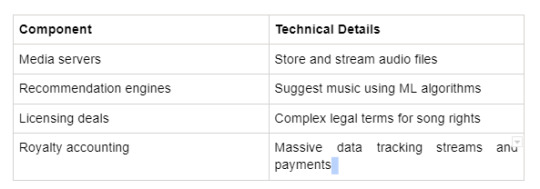
Even at internet scale, the technical nuts and bolts of a music streaming app are daunting!
This is where blockchain comes in.
Understanding Blockchain Technology
Overview of Blockchain: Distributed Ledger Technology
A blockchain is a cryptographically secured distributed ledger that records transactions in an immutable and verifiable manner. It relies on peer-to-peer networking, asymmetric cryptography, and consensus mechanisms to validate transactions in a decentralized way.
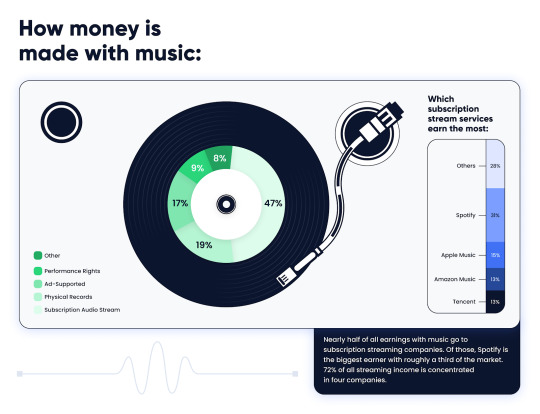
Blockchain Data Structure: Blocks and Transactions
The blockchain is comprised of three main engineering elements: blocks, transactions, and the distributed network. Transactions containing details like sender, receiver, and amount are grouped into blocks. Each validated block is cryptographically chained to the preceding one. This creates an irreversible chronological chain of transactions.
Technical Elements: Decentralization, Cryptography, and Consensus Mechanisms
Decentralization mean no central authority controls the network. Cryptographic functions like hashing and digital signatures ensure security. Consensus mechanisms like proof-of-stake allow decentralized nodes to agree on the network's state. These core precision elements enable blockchain's resilience and transparency.
Smart Contracts: Self-Executing Code on the Blockchain
Smart contracts are programmatic scripts containing business logic that automatically execute when specified conditions are met on the blockchain. They are deployed to and executed by the decentralized network. The determinism and isolation of the execution environment ensures verifiable and predictable computation.
For on-demand music streaming, smart contracts enable automated royalty distribution and rights management.
Technical Impact of Blockchain on Music Streaming Apps
Enhancing Royalty Distribution Efficiency
Technological Details of Smart Contract-Based Royalty Distribution
Smart contracts can be programmed to distribute royalties automatically based on pre-defined rates and usage metrics. Payment rules and recipient addresses are encoded, which enables real-time payment processing without manual intermediaries.
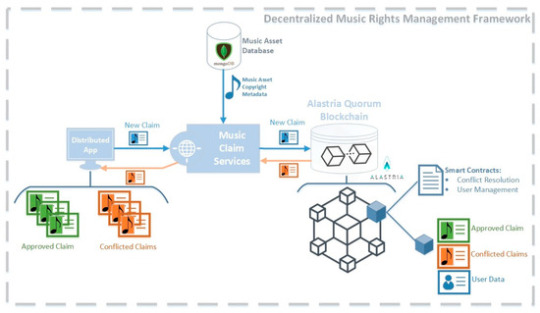
Real-Time Payment Processing
Royalty distribution can be technically optimized to process micro-payments in real-time each time a song is streamed. This granular approach increases accuracy and allows artists to receive instant payments.
Eliminating Intermediaries and Reducing Latency
With an automated system handling royalty calculations and payments, slow manual processing by intermediaries is reduced. This analytical innovation enhances the timeliness of royalty delivery across complex supply chains.
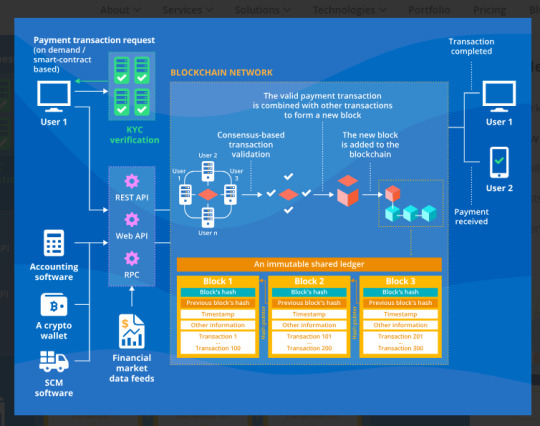
Transparency in Licensing and Rights Management
Immutable Recording of Copyright Ownership
Blockchain's immutable ledger allows copyright ownership and licensing deals to be indelibly recorded. This single source of truth provides clarity on rights ownership to platforms, artists, and publishers.
Automation of Licensing
Licensing terms can be technologically automated by encoding them into smart contracts. Any Music App Development company could instantly verify rights ownership and licensing status for any track via the blockchain rather than through opaque negotiations.
For example, Dot Blockchain has developed a systematic architecture for recording and automating usage-based licensing on media blockchains.
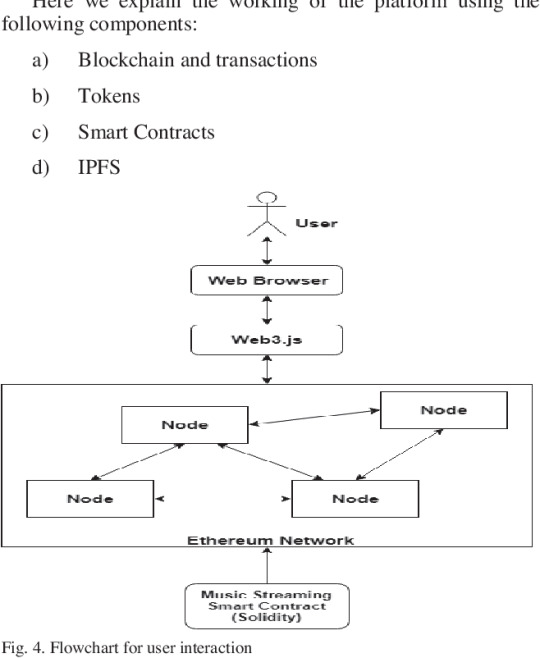
User Experience Enhancements
Seamless Payments and Microtransactions
Music Streaming App can leverage blockchain payments to allow frictionless microtransactions between artists and fans for content and experiences.
Real-Time Analytics for Artists
Artists can be empowered through real-time analytics of fan engagement and royalty data tracked on-chain. Music Streaming Platforms like Revelator provide these procedural capabilities.
Fan Engagement through Tokenization
Loyalty schemes and fan experiences can be built using complex tokenization mechanisms like NFTs for unique engagement opportunities.
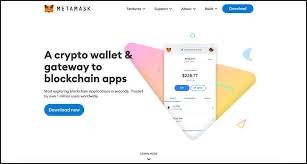
Key Differences Between Traditional Music Systems and Blockchain
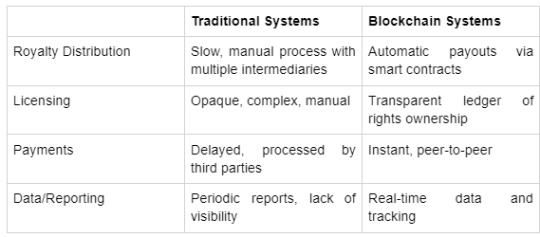

Blockchain Music Streaming App Services
Several startups are already developing blockchain-based music streaming platforms as alternatives to popular apps like Spotify.
For instance, Audius is a streaming service and decentralized protocol that connects artists directly with fans. Artists can share their music and be compensated immediately with the platform’s native AUDIO token. Fans can support artists through subscriptions and tips. Over 100,000 independent artists have joined Audius to date.

Other examples include PeerTracks and Musicoin. These platforms demonstrate how blockchain enables fairer value exchange and compensation for creators in music streaming. As blockchain achieves mainstream adoption, decentralized streaming services could potentially disrupt incumbents.
Limitations of Blockchain in Music Streaming Apps
While blockchain promises many benefits, there are limitations to consider:
Scalability – Blockchains like Ethereum can currently only process 10-20 transactions per second.
Major Music Streaming App Development companies process millions of streams per second, so blockchains need greater scalability to support high volumes. Meanwhile, the computational demands of smart contract execution also limit scalability. Leading music streaming platforms handle millions of plays per second - a massive scalability gap.
However, solutions are emerging, including Ethereum's shift to proof-of-stake consensus, layer 2 scaling protocols like state channels, alternative high-speed blockchains like Solana, and sharding mechanisms. Though still maturing, these innovations illustrate pathways to improve blockchain scalability to meet mainstream demands significantly.
Volatility – Cryptocurrency payments lead to exposure to volatile markets. Appropriate stablecoin solutions are needed to limit risk.
However, stablecoin technology is rapidly evolving through algorithmic designs, collateralization models, and decentralized governance to stabilize valuation. These innovations can potentially reduce the barriers posed by crypto volatility.
Adoption – Moving an entire industry to a new paradigm is challenging. Mainstream adoption will take time, education, and proper governance mechanisms.
Ongoing technology and design improvements can enhance the onboarding process for users.
Centralization – Ironically, many blockchain-based platforms are still centralized in some aspects. Truly decentralized governance is difficult to achieve initially.
Regulatory uncertainties remain a hurdle - decentralized platforms must still comply with copyright laws, licensing rules, royalty rate regulations, and territorial restrictions. Technical innovation alone cannot fully decentralize music streaming governance without legal evolution. However, blockchain communities continue working to increase decentralization through both technological and policy advances.
The potential is clear, but it will take time for blockchain to mature and see significant real-world adoption at scale across music streaming.
Conclusion
As you’ve seen, Blockchain technology presents a fascinating opportunity to evolve the systematic architecture of Music Streaming App Development. Though still facing growing pains around scalability and user adoption, blockchain allows for an open, transparent, and creator-driven music ecosystem.
Integrating blockchain in music streaming appsunlocks valuable, proficient capabilities like instant royalty processing, verifiable licensing rules, and direct fan engagement opportunities. As the technology matures, we can expect more music streaming app startups to harness blockchain to address industry pain points.
Mainstream adoption by major streaming players may take time, given the skillful lift. However, early innovators like Audius highlight the progress and possibilities.
The road ahead is challenging, but music fans, artists, and technologists alike should pay attention as blockchain lays the foundation for the future of music streaming app development.
For those excited about building the next wave of music innovation, partnering with experienced professional teams can help bring blockchain-powered music app ideas to reality. A leading music streaming app development company like Consagous Technologies has the expertise to handle complex blockchain integrations and deliver successful streaming app projects.
By collaborating with proven, knowledgeable talent, the possibilities of blockchain-transforming streaming become closer than ever!
Your Questions Answered
Q: What's the hype around blockchain and music streaming apps?
A: Blockchain has the potential to shake up how music streaming apps work behind the scenes! It offers a transparent, methodical framework to automate royalty payments, record copyright ownership, and create new ways for artists and fans to interact. The hype is around blockchain, making the music streaming app development business more fair and open.
Q: Can blockchain really fix the issues around compensating artists fairly?
A: While blockchain can make royalty distribution more transparent through smart contracts, it does not inherently address the underlying revenue splits, which many argue unfairly favor platforms over artists.
Blockchain provides the technological infrastructure to enforce royalty payments in a timely, transparent way. But, the rules and percentages programmed into the smart contracts could still shortchange artists.
Q: How would blockchain change the user experience of music apps?
A: Listeners could enjoy seamless in-app micropayments, unlock special content through NFT tokens, get rewards for promoting songs, and more. Artists would gain real-time analytics on fan engagement powered by blockchain's transparent data.
Q: Which big music streaming platforms are using blockchain now?
A: None have embraced blockchain in its entirety. But startups like Audius have working models showing blockchain's potential.
Major players are keeping an eye on blockchain, but mainstream adoption is still a work in progress.
Q: How can blockchain support independent artists?
A: By reducing platform dominance and moving interactions to the blockchain, independent artists could gain more ownership over relationships with fans and fair compensation. It offers technological paths to sustain independence.
0 notes
Text
I just randomly remembered the Mulan animated movie and developed a silly idea. f!readerXmaskedman.
So the reader stumbles upon this masked guys channel. She saw many masked cosplayers, but this one... Well, he knows how to film, definitely knows how to wake thirst in his followers, edits his short videos magically, he literally can make her cry or laugh in just a few seconds.
So she follows him. At first, it's not a big deal: his vids just pop up on her fyp every now and then. She leaves a few comments, and one time he even makes a video response to something she wrote. A few times, she even catches his online stream. He's always quite, but even his streams feel like a safe haven: he films his walks, sometimes tinkers his bike, a few times he plays some musical instrument - a guitar or a piano, maybe. Always quiet, always in his costume, always bringing her a smile.
So little by little, she develops a crush. And she is not happy about that. She had enough of guys breaking her heart or just turning out to be douchebags. She promised herself to keep men away, treasure herself. On top of that, falling for a guy in a mask, she never even talked to, feels like sliding back to when she was 15 and could fall for anyone, who appeared to be edgy and enigmatic. And she's over that. So yeah, she's pissed about her feelings. Tries to ignore the guy, but can't help but smile each time the app shows her his new vid, and immediately curse herself for going that way again.
This could go on for a long time, but one day big news drop: the app is going to get banned in her country. A part of her celebrates, because it's high time she cuts the only connection to someone who endangers her happy crushless slumber.
On the last day she opens the app for the last time, checks all the accs, she's been subscribed to. And sees his newest video. "I guess, follow me on other apps, if you're still interested after what I'm about to show you" says the caption under it. She plays the video: It's him in his garage, he walks towards the camera, stops very close to it and removes his mask. And it's a girl. The most beautiful girl, she ever saw.
45 notes
·
View notes
Text
sharing this since most, if not all, of my pals here listen to music.
if you haven’t heard about the latest evil moves Spotify is making, take the time to educate yourself. remember that music streaming was developed in response to the labels’ inability to staunch piracy, and instead of supporting the artists, streaming platforms essentially found ways to profit off legalizing said piracy by becoming a well-paid middle man. the artists still see fractions of pennies per stream, which means only major artists who make most of their money elsewhere anyway get any payout, and streaming platforms are constantly trying to find new loopholes to keep even that meager revenue. it’s time to cancel your Spotify subscriptions and delete the app entirely; they still get ad revenue from listening for free.
other platforms may be *slightly* less overtly evil, but i strongly encourage moving back to building personal music libraries. physical media and even digital collections stored and played on your devices are more sustainable and give you more agency and control over your music listening. it also means that if a streaming site shuts down or the licensing lapses on a particular album, your music won’t be lost to you forever.

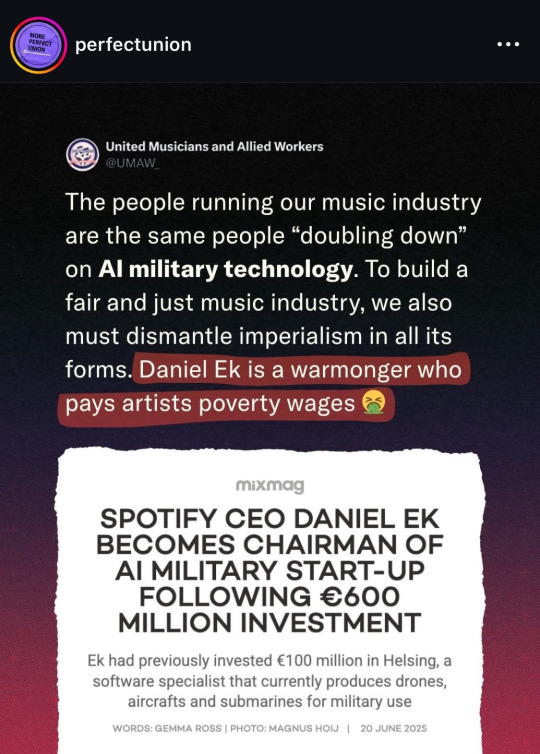
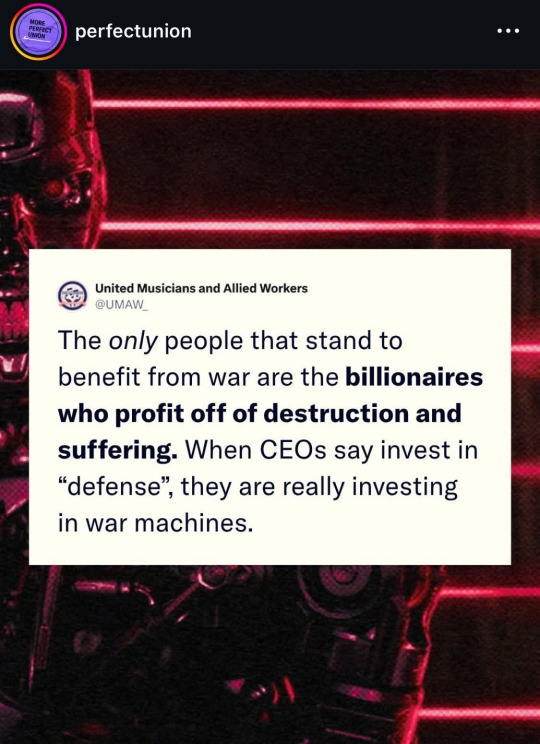
12 notes
·
View notes
Text
This is the WIRED article I mentioned, and I'll share it in full because...girl...
It's an opinion piece, and it's WIRED, so I'm taking it with a grain of salt. But it feels so fucking naive and projected and out of step with how things are, actually?
In the late 19th century, before the invention of cinema and radio, every piece of music, performance, oration—even a natural view like a rainbow—was a unique event. Unrepeatable. Cinema and radio changed that, enforcing a massive shift in how we consumed popular culture. Several of the world’s dominant media companies were founded in that moment by men with a relentless sense of awe for the new media. It resulted in a phenomenal lack of restraint—they didn’t think they needed it. This was the future, and it was making them rich. More was obviously better.
Film and radio would eventually be combined into television—creating an even greater detachment from the performance at its core while supplanting human connection with strategic dopamine sparks. Of course people got hooked: More excitement and no effort equaled a better future. When streaming to personal devices became ubiquitous, that future merged even greater profitability with the law of diminishing returns—crushed empathy, spiked anxiety, and social inadequacy all became core to the human experience.
This has ultimately resulted in a general societal malaise, and I think 2025 will be that moment where some facets of society will begin to methodically detach from their screen-based addictions. I predict the leaders of this change will be the Gen Z digital natives for whom the simplicity of techless exchange will hold a similar novelty to its original technological advances.
Gen Z—currently between 13 to 27 years of age—are the people most deeply affected by digital addiction. After all, they were born in the wake of the invention of the internet. Their primary methods of understanding the world have been digital from the start. Actual agency—connection with other humans—has been largely unavailable for school work, coaching, and guidance. Even the informative mundanity of navigating normal life has been relegated to apps: the screen’s dominance institutionalized with all the restrictions and none of the learned experience for surviving them.
Except their instincts. It’s Gen Z’s instincts that are starting to evolve into a dominant force for change in modern society. What things cost—a massive issue for everyone—is driving much of how Gen Z views their priorities. They’re selecting user-generated content over pricey new media. They’re looking for longer meaning from experiences above the short-term gratification of materialism. In a recent US Gallup poll, more than 50 percent of the respondents indicated they don’t trust tech companies, the government, or the justice system.
Gen Z is also embracing the underconsumption-core and de-influencing trends, questioning the values awe-reverent media brought them, and heightening demands for a life-work balance that would have terrorized the generations before them. These are all positive to crucial developments for society.
So, in 2025, I believe the next step will be for Gen Z to embrace the simplicity of techless human exchange—events without the mediation of the ever-corrupting screen. It’s the shock of the new, a novelty as elemental as film in its infancy. It’s scary, sure—unpredictable—a real change in the digital life they/we are so dominated by. But it’s human and dimensional and full of stuff we can’t get online. It’s what we humans are at our messy core, and for all those reasons I believe we’ll see the virtues of screen retraction start to be celebrated, with Gen Z leading the way.
23 notes
·
View notes
Text
Nintendo just launched a music player app instead of just adding their music to Spotify and Apple music.
It's incredibly laggy and keeps skipping the music and more than half their discography is missing aka they only have Splatoon 3 and the main story's songs (no side order or final fest tunes or splat 1&2)
I'm honestly kind of pissed bc they are a giant corporation, their app shouldn't be running like this and skipping all over the place. It's very hard to find songs and won't just list the songs on the first click, you have to click "all music" on each set of songs instead of the prioritized "top picks" for everything.
Like yes I understand they just launched this. But it's paid for by the online membership and it is shoddy and laggy and hard to use. Also I bet you won't be able to make playlists with "inappropriate names" (aka the type of playlists I make in Spotify such as 'gay and evil music')
Why they couldn't have just dumped everything on already existing streaming services like Capcom and Sega have confounds me. They're like the only game company that doesn't have their shit readily available on Spotify. Fucking Christ nearly every indie developer uploads most of their music on every streaming service too jfc.
#dantes vibe corner#also they havent uploaded classic animal crossing music yet and uhhhhh#i dont like the vibe of them doing big drop releases#also good luck! only pokemon scarlet violet are available for pokemon trafks
27 notes
·
View notes
Text
FuRyu announces school life RPG VARLET for PS5, Switch, and PC - Gematsu

Publisher FuRyu and developer AQURIA have announced school life RPG VARLET for PlayStation 5, Switch, and PC (Steam, Epic Games Store). It will launch on August 28 worldwide.
In Japan, the PlayStation 5 and Switch versions will be available both physically and digitally for 7,980 yen (8,778 yen after tax). A Limited BOX will also be available for 12,680 yen (13,948 yen after tax), which includes an original box, 80-page creative art book, the special album CDs “Character Vocal Side” and “Original Soundtrack Side,” an A5-size canvas board, a code to download the protagonist outfits from Monark and The Caligula Effect 2, and an original sticker.
Here is an overview of the game, via FuRyu:
VARLET draws upon FuRyu’s experience developing immersive, story-driven games, and will challenge players to explore the duality of their own nature as they navigate the perilous high school halls. Welcome within the halls of Kousei Academy, the first school to implement the cross-reality, virtual reality network known as “Johari,” which is used for everything from finding basic information and making purchases to serving as a social networking and messaging app. The app has resulted in a marked increase in users desire for approval and attention amongst peers, and soon an urban legend begins circulating about users disappearing into otherworldly “Glitches” if those desires grow too strong. And worse yet, monsters inhabiting the “Glitches” are said to replace users in the real world leaving everyone none the wiser.
The protagonist soon discovers that this urban legend is very real and some students have already been replaced by monsters, forcing them to take a stand. As a member of the Student Support Services (SSS), a guild dedicated to solving the academy’s troubles, players must guide their friends, strengthen bonds, and fight to protect the school from impending doom. However, navigating these relationships comes with its own challenges—getting too close to multiple people may lead to unexpected consequences. At the core of VARLET‘s experience is its dynamic Triad Stats system, which shapes character progression based on player choices. These six distinct attributes are divided between Light and Dark Triad traits, influencing dialogue options and passive battle skills. Light Triad stats emphasize morality, sympathy, and altruism, while Dark Triad stats lean into Machiavellianism, psychopathy, and narcissism. Players will determine their true nature, either as a guiding leader who uplifts and empowers allies in battle or as a ruthless ruler wielding immense power even at a personal cost.
The game’s staff includes:
-Character Theme Song Composers
Daibakuhashin
Hitoshizuki and Yamasankakkei
KANON69
NILFRUITS
OSTER project
Tadano Kede / A4.
wotaku
Yoshida Yasei
-Background Music: Tsukasa Masuko
-Scenario: Gakuto Mikumo, Ryutaro Ito
-Scenario Editing: Kazunari Suzuki
-Series Original Work: Fuyuki Hayashi
-Production: FuRyu
-Development: AQURIA
-Produce and Direction: Hideaki Ito
-Direction: Takashi Muto
An “Announcement Presentation” live stream will premiere on April 25 at 5:00 a.m. PT / 8:00 a.m. ET / 21:00 JST, featuring the premiere of the opening movie and the latest information on the game with the voice cast. You will be able to watch it on YouTube.
Watch the announcement trailer and music sample videos below. View the first screenshots at the gallery. Visit the official website here: English, Japanese.
Announce Trailer
English
youtube
Japanese
youtube
Theme Song / Soundtrack Sample Video (Special Mini Album CD)
youtube
Background Music Sample Video (Special Mini Album CD)
youtube
11 notes
·
View notes
Text
Apple is warning its iPhone users to delete a common app, claiming it’s a danger to digital privacy.
Without mentioning the company by name, Apple issued a video warning for users to stop using Google Chrome.
In a video titled “Privacy on iPhone | Flock,” parodies Alfred Hitchcock’s 1963 film “The Birds” to demonstrate how browser information isn’t really hidden from trackers.
“Flock” is likely a play on Google’s initial tracking cookie replacement plan called FLoC (Federated Learning of Cohorts), which “is a new way for advertisers and sites to show relevant ads without tracking individuals across the web.”
In the video, iPhone users are being followed by surveillance cameras when browsing the internet, and the cameras finally explode and leave the user alone when they decide to use Safari as their browser.
The video from Apple is gaining traction after Google announced Tuesday that it won’t remove third-party cookies in Chrome after promising to do so.
The controversy has led Apple to promote its browser, Safari, as a “browser that’s actually private.”
Chrome allows websites and advertisers to track users’ activity in order to serve personalized ads, which also brings in a multi-billion-dollar revenue stream for Google.
The 36-year-old didn't respond to reporters' shouted questions as he walked into a Long Island courthouse, but he told The Associated Press on Thursday that he’s resigned to his fate.
“I’m doing as well as any human being would be doing given the circumstances,” Santos wrote in a text message on Thursday, adding that he was “ready to face the music.”
Prosecutors are seeking seven years in federal prison for Santos, arguing in recent court filings that he “remains unrepentant” and has not shown genuine remorse, despite what he claims.
Google initially planned to get rid of third-party cookies and develop a new way to issue targeted ads while still preserving user privacy, but the plan fell apart and the company has chosen to “maintain our current approach to offering users third-party cookie choice in Chrome.”
Tracking cookies aren’t inherently bad themselves, but they can open the door to privacy risks and sometime increase the likelihood of your data and sensitive information being leaked or stolen — meaning if you have an iPhone and use Chrome, you likely will continue to be tracked unless you use Incognito Mode or clear cookies manually.
Apple’s argument that Safari is safer has been backed up by experts, too.
“When it comes down to your security, Safari is probably your best bet,” Elly Hancock from Private Internet Access said in a blog post.
“Safari is more secure and privacy-friendly than Chrome, but Chrome is faster and offers enhanced performance.”
6 notes
·
View notes
Text
Whenever people complain about the long-overdue change from AAA games costing $60 to games costing $70 (which let's be real - they already did in some places back in the 2000's/2010s. Retailers with no nearby competition would sell wii games WAY above market value, all the time. Ask me how I know.) The common refrain is always that spending power is down (true.) and that most of the dev budget and profits aren't even GOING to the developers, the CEOs are just pocketing it (also true.) But it's also hard for me to care about those factors when the expectation for what a game should cost has been thrown out the window.
Sonic Adventure retailed at $60 in the U.S in 1998, which is about $115 in today's money, and it takes 9 hours to clear the whole story. Sonic Frontiers had a larger team, budget, development schedule, and despite the fact it has nearly double the amount of gameplay, it sold at almost half the price of Sonic Adventure. Adjusted for inflation.
When I was in middle school, it was understood that if a game was free, it was most likely made by someone on their free time, and therefore it would probably be short and simple. The mobile apps that were worth your time all cost 99 cents. This was a fee people were willing to pay, because a song on iTunes also cost 99 cents. Games with microtransactions were already taking advantage of gambling addictions, so people were willing to put up with a certain amount of adware on the free app market to avoid them.
Then everything went wrong at once. Free-to-Play video games were popping up all over the place with the amount of content you'd normally expect from the most ambitious AAA titles, and the content updates you'd expect to see from subscription-based MMOs to keep things fresh. Music could be streamed, so nobody wanted to spend 99 cents to own a copy of their favorite song anymore, and suddenly that fee looked too high for apps as well. Then Apple stopped pushing the paid apps, encouraging every developer to make apps that either monetized every corner with ads, or baited players into constant microtransactions so they'd be more than one-time sources of income. And despite being driven primarily by cynical profit motives, the leadership of most American AAA studios wanted to be compared to Hollywood. And so games are being pushed to look more like Movies. Photorealism. Cinematics. Stories that resemble the Movies. Stuff had to be more and more ambitious while costing less and less for the consumer on the frontend, sometimes in ACTUAL dollar amount and sometimes just adjusted for inflation, while also being designed to wring as much money out of every player as humanly possible. It's still going on like this and we all know it isn't fucking sustainable.
But sure. your DLC contains stuff you feel should have been in the base game now. The default price is $10 more - and once they've patched out as many of the issues they were forced to ship with as is realistically possible, you'll get what you paid for out of the experience.
You realize that if you get your reality where we have smaller games with worse graphics made by people paid more to work less, the price of heavily marketed, retail-worthy games will still probably go up, right? Because those likely won't go anywhere, even if they all start to look like what we think of as AA now rather than AAA. For a game to ACTUALLY cost $70 it'd need to maintain mass market appeal so it could sell enough copies to make back budget and probably fund the next dev cycle. Because in this world, game devs wouldn't be beholden to shareholder interests, right?
I'm not saying this to discourage you from that way of thinking in the slightest. I'm just pointing out that, as with SO many things in our lives, your sense of what something costs to produce is incredibly divorced from reality because of just HOW exploited the labor behind it is.
But to be completely honest, if an extra $10 on the base price of SOME PS5 games is enough of a stumbling block for you, I don't know how you'll handle the value for that money decreasing, as well.
12 notes
·
View notes